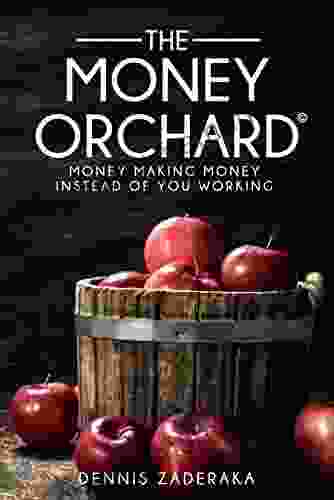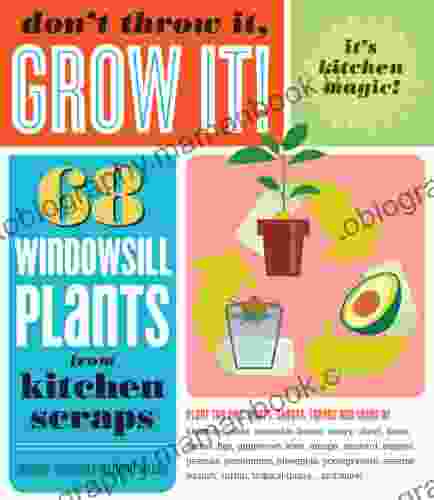Don't Throw It, Grow It!: A Comprehensive Guide to Kitchen Scraps Composting

In an era of growing environmental awareness, reducing waste and promoting sustainability has become a pressing concern. Food waste, in particular, accounts for a significant portion of the waste generated in households. By embracing the practice of kitchen scraps composting, we can not only divert organic waste from landfills but also create a valuable resource for our gardens.
Understanding Composting: The Magic of Decomposition
Composting is the natural process of breaking down organic matter, such as kitchen scraps, into a nutrient-rich soil amendment known as compost. This process is facilitated by microorganisms, including bacteria and fungi, that break down the complex organic compounds into simpler substances. The end result is a dark, crumbly material that is rich in nutrients such as nitrogen, phosphorus, and potassium, which are essential for plant growth.
4.3 out of 5
| Language | : | English |
| File size | : | 8882 KB |
| Text-to-Speech | : | Enabled |
| Screen Reader | : | Supported |
| Enhanced typesetting | : | Enabled |
| X-Ray | : | Enabled |
| Print length | : | 161 pages |
| Lending | : | Enabled |
Benefits of Kitchen Scraps Composting
Incorporating kitchen scraps composting into your routine offers numerous benefits, both for the environment and your garden:
- Reduces waste: Composting significantly reduces the amount of organic waste going into landfills, preventing it from decomposing anaerobically and releasing harmful greenhouse gases.
- Enriches soil: Compost improves soil structure, aeration, and water retention, providing a healthy foundation for plant growth.
- Reduces fertilizer costs: Compost provides a natural source of nutrients for plants, reducing the need for chemical fertilizers and saving money.
- Promotes sustainability: Composting promotes a closed-loop system, where organic waste is recycled into a valuable resource, minimizing environmental impact.
Starting a Compost Pile or Bin
Getting started with kitchen scraps composting is surprisingly easy. Here's a step-by-step guide to help you get started:
1. Choose a Location
Select a spot in your backyard, preferably in a shady area, for your compost pile or bin. Ensure it's well-aerated and has access to water.
2. Build the Pile/Bin
There are two main options for composting: a compost pile or a compost bin. Compost piles are simpler and cheaper, while compost bins provide more control over the composting process.
For a compost pile, simply pile up layers of kitchen scraps and other organic matter in a heap. For a compost bin, use a commercially available bin or construct your own using wood, chicken wire, or pallets.
3. Collect Organic Materials
Start collecting kitchen scraps such as vegetable peelings, fruit cores, coffee grounds, and tea bags. You can also add other organic materials such as leaves, grass clippings, and shredded paper. Avoid meat, dairy, and oily foods, as these can attract pests and slow down the composting process.
4. Maintain the Composition
For optimal composting, maintain a balance between "brown" materials (such as leaves and paper) and "green" materials (such as kitchen scraps). A good rule of thumb is to have a ratio of 2 or 3 parts brown to 1 part green.
Additionally, add water occasionally to keep the compost moist, but not soggy. Turn the compost regularly, using a shovel or pitchfork, to aerate it and speed up the decomposition process.
Troubleshooting Common Issues
Composting can be a straightforward process, but occasionally you may encounter some issues:
1. The Compost is Smelly
If your compost has an unpleasant odor, it's likely too wet or has too much green material. Add more brown materials, such as leaves or shredded paper, and turn the compost more frequently to aerate it.
2. The Compost is Too Dry
A dry compost will slow down the decomposition process. Add water gradually, turning the compost as you do, until it reaches a moist, crumbly texture.
3. The Compost is Not Decomposing
If your compost is not decomposing properly, it may be too dense and not getting enough air. Turn the compost more frequently to aerate it and add some small twigs or wood chips to create air pockets.
Using Compost in the Garden
Once your compost is ready, it's time to use it in your garden. Compost can be incorporated into the soil as a soil amendment, used as a mulch around plants, or brewed into a liquid fertilizer. By providing essential nutrients to your plants, compost helps them grow healthy and strong.
Don't Throw It, Grow It! Kitchen scraps composting is a rewarding and environmentally friendly practice that can significantly reduce waste, enrich your soil, and support a sustainable lifestyle. Embrace the transformation of kitchen scraps into a valuable resource for your garden and contribute to a more sustainable future.
4.3 out of 5
| Language | : | English |
| File size | : | 8882 KB |
| Text-to-Speech | : | Enabled |
| Screen Reader | : | Supported |
| Enhanced typesetting | : | Enabled |
| X-Ray | : | Enabled |
| Print length | : | 161 pages |
| Lending | : | Enabled |
Do you want to contribute by writing guest posts on this blog?
Please contact us and send us a resume of previous articles that you have written.
 Top Book
Top Book Novel
Novel Fiction
Fiction Nonfiction
Nonfiction Literature
Literature Paperback
Paperback Hardcover
Hardcover E-book
E-book Audiobook
Audiobook Bestseller
Bestseller Classic
Classic Mystery
Mystery Thriller
Thriller Romance
Romance Fantasy
Fantasy Science Fiction
Science Fiction Biography
Biography Memoir
Memoir Autobiography
Autobiography Poetry
Poetry Drama
Drama Historical Fiction
Historical Fiction Self-help
Self-help Young Adult
Young Adult Childrens Books
Childrens Books Graphic Novel
Graphic Novel Anthology
Anthology Series
Series Encyclopedia
Encyclopedia Reference
Reference Guidebook
Guidebook Textbook
Textbook Workbook
Workbook Journal
Journal Diary
Diary Manuscript
Manuscript Folio
Folio Pulp Fiction
Pulp Fiction Short Stories
Short Stories Fairy Tales
Fairy Tales Fables
Fables Mythology
Mythology Philosophy
Philosophy Religion
Religion Spirituality
Spirituality Essays
Essays Critique
Critique Commentary
Commentary Glossary
Glossary Bibliography
Bibliography Index
Index Table of Contents
Table of Contents Preface
Preface Introduction
Introduction Foreword
Foreword Afterword
Afterword Appendices
Appendices Annotations
Annotations Footnotes
Footnotes Epilogue
Epilogue Prologue
Prologue Glyn Iliffe
Glyn Iliffe Sakari Howell
Sakari Howell Hugh Sinclair
Hugh Sinclair Preeti Shenoy
Preeti Shenoy Langston Hughes
Langston Hughes Thomas Thompson
Thomas Thompson Rollo Tomassi
Rollo Tomassi Crystal Senter Brown
Crystal Senter Brown John L Rury
John L Rury Richard Wilson
Richard Wilson Wade D Pfau
Wade D Pfau Grady Hendrix
Grady Hendrix Jasmine Supreme
Jasmine Supreme Chiara Giuliani
Chiara Giuliani P Boonpa
P Boonpa John Stack
John Stack Jack Goldstein
Jack Goldstein G M Jackson Iii
G M Jackson Iii Julia Ross Ma
Julia Ross Ma Tammy Wylie
Tammy Wylie
Light bulbAdvertise smarter! Our strategic ad space ensures maximum exposure. Reserve your spot today!
 Edgar Allan PoeFollow ·11.5k
Edgar Allan PoeFollow ·11.5k Clinton ReedFollow ·3.3k
Clinton ReedFollow ·3.3k Bruce SnyderFollow ·8.4k
Bruce SnyderFollow ·8.4k Dakota PowellFollow ·5k
Dakota PowellFollow ·5k Kurt VonnegutFollow ·2.6k
Kurt VonnegutFollow ·2.6k Morris CarterFollow ·12.9k
Morris CarterFollow ·12.9k Jordan BlairFollow ·4.2k
Jordan BlairFollow ·4.2k Isaac MitchellFollow ·16.1k
Isaac MitchellFollow ·16.1k

 Oscar Bell
Oscar BellDream Keeper II by Parris Afton Bonds: An Exploration of...
Dream Keeper II by Parris...

 Eric Hayes
Eric Hayes100 Ultimate Smooth Jazz Riffs For Violin: Elevate Your...
Welcome to the ultimate...

 Vernon Blair
Vernon BlairAll You Need to Know to Start Investing and Trading...
Binance is...

 Greg Foster
Greg FosterShalott: Into the Unknown
In the heart of medieval...

 Will Ward
Will WardMoney Making Money Instead of You Working: Unleashing the...
In a world where...
4.3 out of 5
| Language | : | English |
| File size | : | 8882 KB |
| Text-to-Speech | : | Enabled |
| Screen Reader | : | Supported |
| Enhanced typesetting | : | Enabled |
| X-Ray | : | Enabled |
| Print length | : | 161 pages |
| Lending | : | Enabled |














